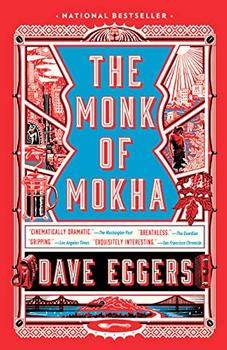Summary | Excerpt | Reading Guide | Reviews | Beyond the Book | Readalikes | Genres & Themes | Author Bio

BOOK I
CHAPTER I
The Satchel
Miriam gave things to Mokhtar. Usually books. She gave him Das Kapital. She gave him Noam Chomsky. She fed his mind. She fueled his aspirations. They dated for a year or so, but the odds were long. He was a Muslim Yemeni American, and she was half-Palestinian, half-Greek and a Christian. But she was beautiful, and fierce, and she fought harder for Mokhtar than he fought for himself. When he said he wanted to finally get his undergraduate degree and go to law school, she bought him a satchel. It was a lawyerly valise, made in Granada, painstakingly crafted from the softest leather, with brass rivets and buckles and elegant compartments within. Maybe, Miriam thought, the object would drive the dream.
Things were clicking into place, Mokhtar thought. He had finally saved enough money to enroll at City College of San Francisco and would start in the fall. After two years at City, he'd do two more at San Francisco State, then three years of law school. He'd be thirty when he finished. Not ideal, but it was a time line he could act on. For the first time in his academic life, there was something like clarity and momentum.
He needed a laptop for college, so he asked his brother Wallead for a loan. Wallead was less than a year younger—Irish twins, they called each other—but Wallead had things figured out. After years working as a doorman at a residential high-rise called the Infinity, Wallead had enrolled at the University of California, Davis. And he had enough money saved to pay for Mokhtar's laptop. Wallead charged the new MacBook Air to his credit card, and Mokhtar promised to pay back the eleven hundred dollars in installments. Mokhtar put the laptop in Miriam's satchel; it fit perfectly and looked lawyerly.
Mokhtar brought the satchel to the Somali fund-raiser. This was 2012, and he and a group of friends had organized an event in San Francisco to raise money for Somalis affected by the famine that had already taken the lives of hundreds of thousands. The benefit was during Ramadan, so everyone ate well and heard Somali American speakers talk about the plight of their countrymen. Three thousand dollars were raised, most of it in cash. Mokhtar put the money in the satchel and, wearing a suit and carrying a leather satchel containing a new laptop and a stack of dollars of every denomination, he felt like a man of action and purpose.
Because he was galvanized, and because by nature he was impulsive, he convinced one of the other organizers, Sayed Darwoush, to drive the funds an hour south, to Santa Clara, that night—immediately after the event. In Santa Clara they'd go to the mosque and give the money to a representative of Islamic Relief, the global nonprofit distributing aid in Somalia. One of the organizers asked Mokhtar to bring a large cooler full of leftover rooh afza, a pink Pakistani drink made with milk and rose water. "You sure you have to go tonight?" Jeremy asked. Jeremy often thought Mokhtar was taking on too much and too soon.
"I'm fine," Mokhtar said. It has to be tonight, he thought.
So Sayed drove, and all the way down Highway 101 they reflected on the generosity evident that night, and Mokhtar thought how good it felt to conjure an idea and see it realized. He thought, too, about what it would be like to have a law degree, to be the first of the Alkhanshalis in America with a JD. How eventually he'd graduate and represent asylum seekers, other Arab Americans with immigration issues. Maybe someday run for office.
Halfway to Santa Clara, Mokhtar was overcome with exhaustion. Getting the event together had taken weeks; now his body wanted rest. He set his head against the window. "Just closing my eyes," he said.
Excerpted from The Monk of Mokha by Dave Eggers. Copyright © 2018 by Dave Eggers. All rights reserved. No part of this excerpt may be reproduced or reprinted without permission in writing from the publisher.
Wisdom is the reward you get for a lifetime of listening when you'd rather have been talking
Click Here to find out who said this, as well as discovering other famous literary quotes!
Your guide toexceptional books
BookBrowse seeks out and recommends the best in contemporary fiction and nonfiction—books that not only engage and entertain but also deepen our understanding of ourselves and the world around us.